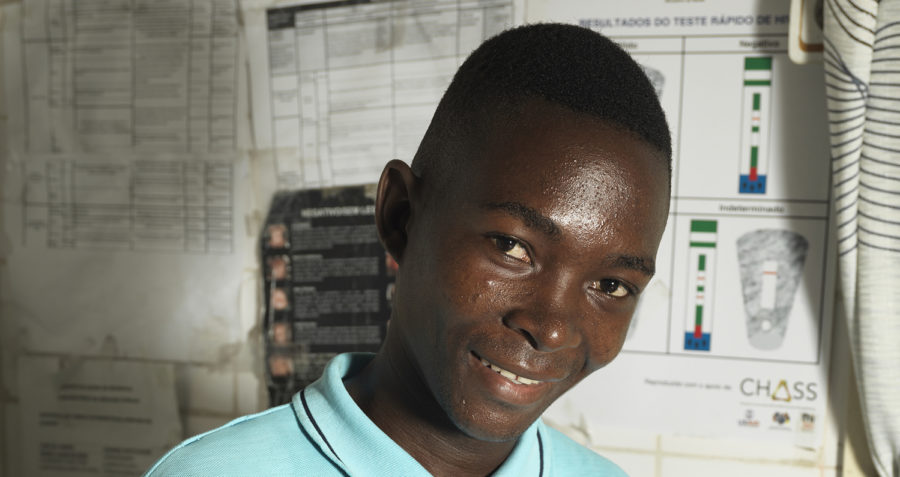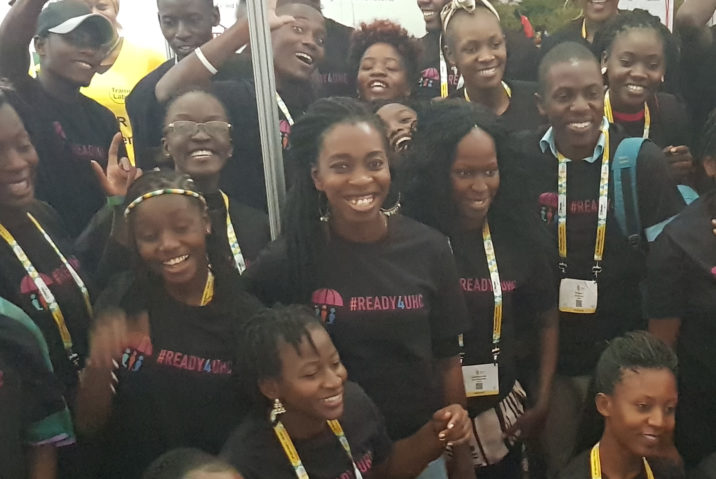READY for universal health coverage
 ©Peter Caton for READY
©Peter Caton for READY
We hear from four youth advocates on their efforts to ensure young people’s voices are heard in universal health coverage discussions.
What proactive steps have governments taken to involve young people in national discussions on universal health coverage (UHC)?
Toyin Chukwudozie, Nigeria
The government’s involvement of young people in Nigeria’s UHC discussion leaves a lot to be desired. The reality is that young people are seeking out opportunities to engage the government on the issue, not the other way round. Although the government has convened UHC meetings and invited young people, usually no space is given for us to speak up on our issues.
Cindy Amaiza, Kenya
Earlier this year not much in Kenya’s proposed UHC framework addressed the issues of young people or people living with HIV, which is why we and other communities petitioned against it being launched countrywide.
The framework was due to use the National Health Insurance Fund. But this means I would have to start paying 6 to 12 months before I could access healthcare. If I got sick during that period I would have to pay out of pocket. Even if I made high monthly contributions, I would be only entitled to US$15 of cover per visit up to a maximum of US$65 per year. This would severely limit the number of times I could get treatment or visit a health centre .
The UHC framework is now being reviewed, but we are yet to be consulted.
Sílvio Macuane, Mozambique
The government is designing a UHC package but the discussion remains very technical and young people are not yet involved. To help promote young people’s involvement in the process, last year the Partnership to Inspire, Transform and Connect the HIV response organised the country’s first UHC workshop, led UHC Day festivities, and invited key government representatives from the Ministry of Health and National Council Against AIDS to a UHC roundtable.
How are you and your organisation moving forward on UHC, especially in light of COVID-19?
Annah Sango, Zimbabwe
The UHC principle of ‘leaving no one behind’ has been compromised. Poor and vulnerable people are facing hardship because of rising healthcare user fees. Zimbabwe Young Positives (ZY+) and other civil society organisations are opposing this increase, but the economic situation in Zimbabwe is worsening.
We can’t talk about UHC if we don’t focus on availability, accessibility, affordability and acceptability of quality health services, without discrimination. But this is proving difficult in Zimbabwe during lockdown as many people can’t afford or even access services. People at higher risk of HIV are struggling to have their healthcare needs met. ZY+ is concerned that some young people living with HIV have missed their appointments due to fear of intimidation, humiliation and accidental disclosure.
Most health centres are focusing on COVID-19 only, resulting in the suffering or even death of young people living with HIV as they fail to access essential healthcare.
Toyin
We organised a meeting between government representatives involved in UHC implementation and civil society organisations, including those involving adolescent girls and young women and people at higher risk of HIV. The focus of this meeting was to discuss the concept of UHC, explain what the Basic Health Care Provision Fund (BHCPF) is – the vehicle for implementing UHC – and discuss who is missing in the conversation.
We have now developed a brief to show the gaps in the current BHCPF and outline recommendations to include adolescents and young people as beneficiaries.
COVID 19 has made the gaps in the health system become more obvious. This is giving more weight to our assertion that, in a system that struggles to cater for the health of its citizens, young people tend to be even more left behind. We are working on a stakeholder brief to ensure lessons from the COVID-19 response are not wasted. This will highlight specific issues, such as user fees that prevent young people from accessing essential healthcare.
Cindy
We have incorporated UHC information in our meetings and learning sessions, which we are now holding online and via Facebook Live. We have also collected random opinions in our chatbox on how to improve Kenya’s UHC plan so that it works for adolescents and young people and are now advocating for some of these ideas to be included in the Kenya AIDS Strategic Framework (KASF).
Sílvio
The COVID-19 crisis presents an opportunity to persuade leaders to take the need for UHC seriously – universal threats need universal responses, and universal responses are only effective if no one is left behind.
What are your networks and/or organisations doing to ensure the experiences of young people from marginalised groups are included in UHC discussions?
Cindy
In partnership with Ambassador for Youth and Adolescent Rep Health (AYARHEP) and bigger organisations like the National Empowerment Network of People Living with HIV/AIDS in Kenya (NEPHAK), we have worked to ensure that the KASF includes UHC coverage for vulnerable populations, including adolescents and young people. KASF is now under review and we are waiting to see if our inputs have been incorporated.
Sílvio
COALIZÃO has been participating in meetings with community and health leaders. Here we share evidence from our monitoring of youth-friendly health services, discuss young people’s needs and challenges relating to the quality of health services provided. We also ensure young people are involved in technical meetings held by the Ministry of Health and the National Council Against AIDS and are engaging with parliamentarians. Parliament has accepted our invitation to hold a closed meeting with all national PITCH partners so that they can understand better the needs of young people who come from groups at higher risk of HIV.

Annah
To mark International Day Against Homophobia, Transphobia and Biphobia (17 May), the READY movement hosted a #READY4UHC Twitter chat with a panel of young transgender people from Kenya, Nigeria, South Africa and Uganda. Panellists explored the gaps in the COVID-19 response and the invisibility of transgender youth in national discussions. #READY4UHC is a call to action for young people to join UHC conversations to ensure their needs are heard, particularly young people from marginalised groups.
Toyin
We are documenting experiences of young people in accessing healthcare, such as a documentary that we recently produced, then using the evidence to advocate for making healthcare accessible, affordable, and equitable for all young people in Nigeria. The country’s Adolescent Health Policy is currently under review and we have made the case for the health needs of young marginalised people to be included. We will continue to ensure that young people are meaningfully involved in advocacy efforts towards a UHC that works for everyone, everywhere, devoid of prejudices, stigma and discrimination.
Cindy Amaiza is the National Coordinator, Y+ Kenya, a PITCH partner, Toyin Chukwudozie is Team Leader Advocacy and Policy Influencing, Education as a Vaccine (EVA), a PITCH and Frontline AIDS partner, Sílvio Macuane is the PITCH Coordinator, COALIZÃO, and Annah Sango is the National Coordinator, Zimbabwe Young Positives (ZY+), a PITCH and READY+ partner.
The Partnership to Inspire Transform and Connect the HIV response (PITCH), is a strategic partnership between Aidsfonds, Frontline AIDS, and the Dutch Ministry for Foreign Affairs
Tags
Adolescents and young peoplePITCHREADYUniversal Health Coverage (UHC)

